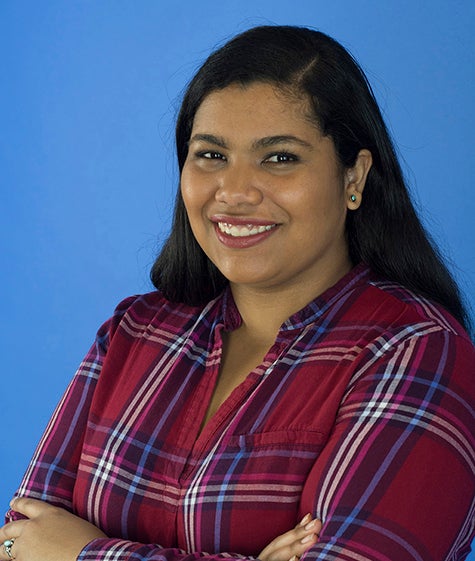KINGSTON, R.I. – April 19, 2017 – University of Rhode Island senior Vanessa Garcia Polanco always knew she wanted a career that combined the environment and helping people. That combination has pointed her toward an interdisciplinary approach to solving environmental problems, one that examines the issues from not only a scientific perspective but also from an economic and social welfare perspective.
As she prepares to graduate from URI on May 21 with a bachelor’s degree in environmental and natural resource economics, Garcia Polanco is well on her way to the career she envisions, having achieved scholastic success while also making a name for herself in the university community and beyond.
“When we talk about the environment, we’re not just talking about natural resources,” she said. “It’s social, too. That’s what interests me – how we relate to the environment, how we care for the environment, and how does environmental quality affect our communities and how wealthy we are. The environment is connected to the way we live today and the way we’ll live in the future.”
A native of the Dominican Republic who moved to North Providence as a teenager, Polanco has focused much of her academic and extracurricular interest on the environmental, economic and social aspect of food.“In the Dominican Republic, I felt really connected to food. Knowing where my food came from was simple – it was grown locally. Agriculture is central to the way of life,” Garcia Polanco said. “But moving here, I found that food was more related to economic development. The Rhode Island economy is trying to be more food-centric, but the culture isn’t there yet.”
Her focus on food – including a job at the URI Cooperative Extension, where she promotes research-based horticulture education and resources – resulted in her being accepted as the youngest ever member of the Rhode Island Food Policy Council. The council membership includes farmers, fishermen, scientists, and food retailers and distributors who promote local food and agriculture and develop policy recommendations for the governor.
“It’s been a big responsibility and honor,” said Garcia Polanco, who ran the North Providence farmer’s market as a senior in high school while also serving on the board of the North Central Chamber of Commerce. “Mostly I’ve been reviewing documents and learning as much as I can. I feel I can bring a younger perspective to things. The biggest challenge about my generation is that we romanticize agriculture, which could be a good thing. We need to recruit young people to this industry since so many farmers are nearing retirement.”
In addition to her role on the Food Policy Council, Garcia Polanco served for two years as the president of Student Action for Sustainability, a URI group that helped to organize environmental education programs for Earth Day, Sustainability Week, and other events.
She also was an elected member of the URI Student Senate during all four years of her college career, serving as academic chair as a senior.
“Public service is a duty and a responsibility, something I just have to do,” said Garcia Polanco. “I’m not afraid of making important decisions or advocating for certain services or resources. It comes mostly from my upbringing in the Dominican Republic, where we as a nation fought for independence so many times. But I was also lucky enough to have mentors in North Providence who fostered that in me as well.”
With just weeks to go before graduation, Polanco is looking for a part-time job in the food or agriculture industry while she prepares for graduate school. Her goal is to eventually direct a regional food agency like Farm Fresh Rhode Island.
“We need a food system that meets the needs of the community,” she said. “It doesn’t all have to be local – I actually prefer regional approaches – because some products, like dairy and cheese, are better to produce in larger scales. I can see that side of the picture. The key is making compromises between the environment and economics.
“The words balance and compromise are key,” she concluded. “It allows us to negotiate and keep an open mind in food and agriculture policy.”

